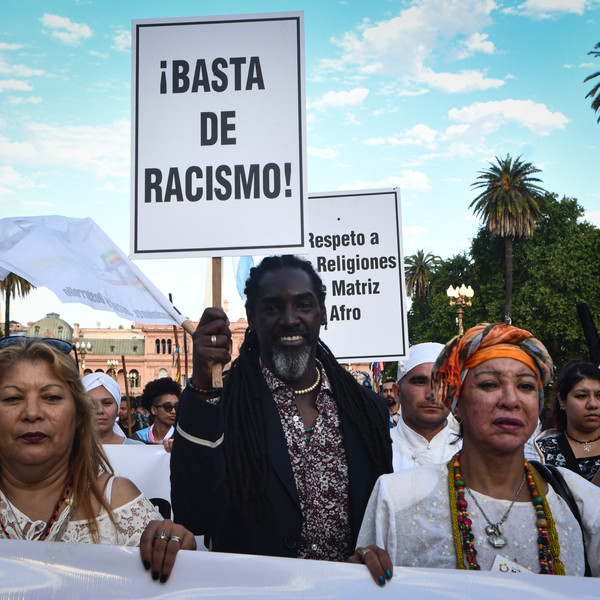Argentina is known for its rich cultural heritage, but a lesser-known aspect is its vibrant Afro-Argentine community. Afro-Argentine culture represents a unique blend of African traditions and Argentine influences, contributing to the country’s diverse and multifaceted cultural landscape.
Dating back to the transatlantic slave trade and subsequent immigration from Africa, the Afro-Argentine population once accounted for up to 50% of certain cities during the 18th and 19th centuries. While the community’s numbers have diminished due to factors like racial intermixing and government assimilation efforts, the impact of Afro-Argentines on Argentina’s history, culture, and society remains profound.
The Origins of African Slavery in Argentina
African slavery played a significant role in shaping the cultural and economic landscape of Argentina. Beginning in the 16th century, enslaved Africans were transported through the port of Buenos Aires, primarily from West and Central African regions, such as Angola and the Congo. The slaves were forced to work in agriculture, livestock, domestic services, and skilled crafts. The port city of Buenos Aires became a hub for the slave trade, with thousands of enslaved individuals being sold and distributed throughout the region.
| Year | Estimated Afro-Argentine Population (%) | Cities with Major Afro-Argentine Communities |
|---|---|---|
| 1700s | Up to 50% | Buenos Aires, Córdoba, Mendoza |
| 1800s | 30%-40% | Buenos Aires, Entre Ríos, Santiago del Estero |
| 1900s | Below 10% | Buenos Aires, Rosario |
The Cultural Contributions of Afro-Argentines
Although the Afro-Argentine population has declined, their contributions to Argentina’s culture are undeniable. From music and dance to literature and religion, Afro-Argentines have left an indelible mark on the country’s cultural identity.
Dance: The Roots of Tango and Candombe
One of the most recognizable cultural legacies of Afro-Argentines is their influence on tango and candombe. Tango, now synonymous with Argentine culture, has roots in African rhythmic structures and movements. Meanwhile, candombe, a drum-based Afro-Uruguayan rhythm, has become a beloved musical tradition in Argentina, particularly during Carnival in Buenos Aires.
Literature: Contributions to Argentina’s Literary Canon
While Afro-Argentine literature is often underrepresented, notable writers like Victoria Ocampo and Jorge Luis Borges (both influenced by Afro-Argentine themes) have contributed to Argentina’s literary world by incorporating elements of Afro-Argentine history and identity.
Religion: Santería and Umbanda in Argentina
Afro-Argentines have also preserved Afro-Latin religions such as Santería and Umbanda. These religions, rooted in West African spiritual traditions, serve as a connection to ancestral roots and offer a source of cultural preservation and identity within the Afro-Argentine community.
| Field | Afro-Argentine Contributions |
|---|---|
| Dance | Tango, Candombe |
| Music | Afro-Argentine rhythms, drumming |
| Cuisine | African-influenced spices and dishes |
| Religion | Santería, Umbanda |
The Influence of Afro-Argentine Culture on Argentine Cuisine
Afro-Argentine culinary traditions have had a lasting influence on Argentine cuisine, especially in the use of African spices and cooking methods. Dishes such as mondongo (tripe stew) and mbejú (a type of cornbread) have their roots in African gastronomy. Similarly, the preparation of asado (Argentine barbecue) echoes traditional African slow-cooking techniques.
| Ingredient | Description |
|---|---|
| Yucca | Starchy root used in Afro-Argentine dishes |
| Plantains | Savory and sweet dishes inspired by African cuisine |
| Black Beans | A staple in stews and side dishes |
Also Read:
The Challenges and Struggles of Afro-Argentines

Despite their immense contributions, Afro-Argentines have historically faced challenges of social inequality, discrimination, and underrepresentation. During the 19th and 20th centuries, efforts to “whiten” the population, combined with limited historical documentation of Afro-Argentines, led to the marginalization of the community.
However, recent years have seen a resurgence in the visibility and recognition of Afro-Argentines. Activist organizations, such as La Fundación Africa Vive, have been at the forefront of advocating for cultural preservation, greater political representation, and inclusion.
Preserving and Revitalizing Afro-Argentine Culture
In the face of historical erasure, Afro-Argentine culture is experiencing a revitalization. Preservation efforts led by cultural organizations and initiatives are working to restore and celebrate the heritage of Afro-Argentines. Events like Candombe festivals and the establishment of cultural centers provide spaces for education, community building, and artistic expression.
| Preservation Effort | Impact |
|---|---|
| Cultural Centers | Spaces for engagement and artistic expression |
| Festivals | Celebrating Afro-Argentine traditions |
| Educational Programs | Promoting awareness and understanding |
Afro-Argentine Heritage Sites
Argentina is home to several sites of historical significance for Afro-Argentines, serving as tangible reminders of their contributions. These heritage sites offer insight into the Afro-Argentine experience and provide an educational foundation for understanding their influence.
- Capilla de los Negros: A chapel built by freed slaves in 1861, symbolizing resilience and faith.
- El Zanjón de Granados: A museum in San Telmo that highlights the role of slavery in Buenos Aires’ development.
- Museo Las Lilas de Areco: Showcasing the history of Afro-Argentine gauchos, who played a key role in the formation of Argentine identity.
Looking Forward: The Path to Recognition and Inclusion
As Argentina continues to acknowledge its Afro-Argentine history, there is growing recognition of the need for greater inclusivity and representation. The future of Afro-Argentine culture lies in the hands of activists, artists, and educators, who are working tirelessly to ensure that this rich heritage is not only preserved but celebrated.
By fostering awareness, education, and cultural pride, Argentina can continue to build a society that values its diverse roots and promotes equality for all.
FAQ
What is Afro-Argentine culture?
Afro-Argentine culture refers to the cultural heritage and traditions of people in Argentina of primarily Sub-Saharan African descent.
How did African slavery impact Argentina?
African slavery in Argentina began in the 16th century and had a significant impact on the country’s economy and culture. Slaves were forced to work in various sectors, including agriculture, livestock, domestic work, and crafts.
What contributions have Afro-Argentines made to Argentine society?
Afro-Argentines have made significant contributions to Argentine culture, including influencing dance styles like tango and candombe, contributing to literature, and shaping Afro-Argentine religious practices and traditions.
How is Afro-Argentine culture being preserved and celebrated?
Efforts are being made to preserve and revitalize Afro-Argentine culture through cultural organizations, events, festivals, and educational programs.
Are there any Afro-Argentine heritage sites in Argentina?
Yes, there are several Afro-Argentine heritage sites in Argentina, including the Capilla de los Negros, El Zanjón de Granados museum, and the Museo Las Lilas de Areco.
How has Afro-Argentine culture influenced Argentine cuisine?
African culinary traditions have been incorporated into Argentine cooking, resulting in unique flavors and dishes that include spices like cumin, coriander, and paprika.
How are Afro-Argentines represented in media and the arts?
Afro-Argentine actors, musicians, artists, and photographers have gained recognition and are using their talents to showcase Afro-Argentine culture.
What challenges do Afro-Argentines face in terms of rights and recognition?
Afro-Argentines continue to face discrimination, marginalization, and barriers to equal opportunities in education, employment, and social advancement.
Has Afro-Argentine culture gained international recognition?
Yes, Afro-Argentine music, dance, and art have gained international recognition, and Afro-Argentine performers have toured and showcased their talents worldwide.
What does the future hold for Afro-Argentine culture?
Ongoing efforts to preserve and celebrate Afro-Argentine heritage, promote awareness, and support cultural initiatives are crucial for the future of Afro-Argentine culture.
To truly appreciate the depth of Afro-Argentine culture, understanding the language and local traditions is key. By learning Spanish in Argentina at Vamos Academy, you can immerse yourself in Argentina’s rich cultural heritage, from its vibrant communities to its historical landmarks. Start your journey with us and explore Argentina’s diverse stories firsthand. And that´s it. If you want to learn more about Vamos Academy you can visit our Language School in Malaga or find a Spanish Teacher Online.






